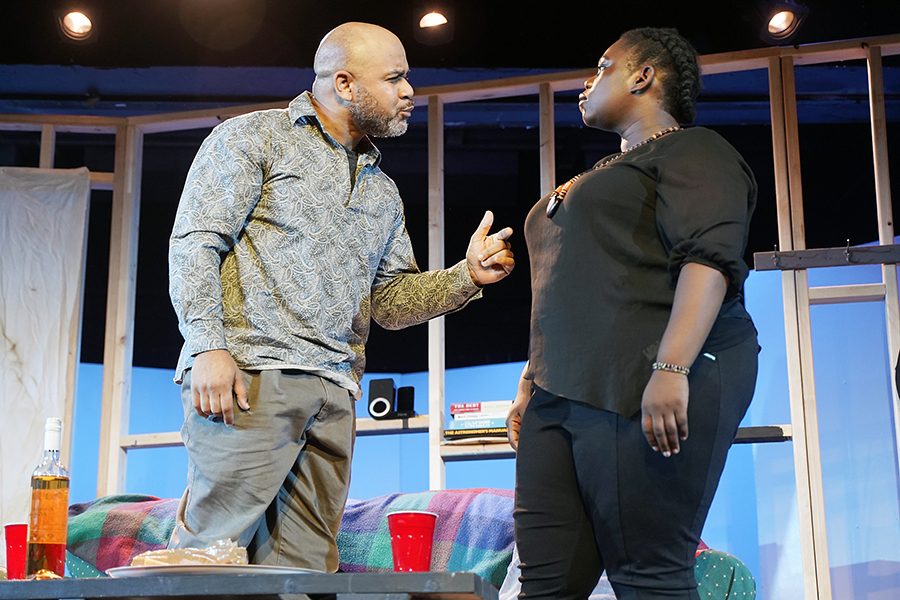Fleetwood-Jourdain Theater presents Dominique Morisseau’s “Sunset Baby”
An actor in Fleetwood-Jourdain’s production of “Sunset Baby.” The show opened on Saturday, and will run three weekends before closing July 28th.
July 15, 2019
When Tim Rhoze, the artistic director of Fleetwood-Jourdain Theatre, first read the play “Sunset Baby” a few years ago, he immediately became a fan. Struck by Dominique Morisseau’s depiction of a complex father-daughter relationship and marginalized people trying to build better lives for themselves, Rhoze thought it would be a thought-provoking work to share with a wider audience.
“I was taken with the sincerity of Dominique Morisseau’s writing, and how she is able to use language and imagery to move her story forward and keep it compelling,” Rhoze said. “I knew one day I would have the opportunity to direct it.”
This summer, Rhoze is getting his wish. Fleetwood-Jourdain opened its production of “Sunset Baby” this past Saturday. Directed by Rhoze, the show will run for three weekends before closing July 28.
“Sunset Baby” focuses on Nina, a young drug dealer whose parents were prominent black revolutionaries. When her mother dies, Nina’s estranged father, Kenyatta, who abandoned his family many years ago, walks back into her life. He is searching for a series of letters her mother wrote to him but never sent — now valuable after she passed away because of the couple’s connection to the black power movement.
Still resentful toward her father, the emotionally guarded Nina struggles to decide if she can forgive Kenyatta, and his presence causes her to reevaluate what she wants in life.
Jazzma Pryor, who plays Nina in Fleetwood-Jourdain’s production, said Nina and Kenyatta’s conflict raises the question of what it takes to forgive someone and move beyond mistakes made in the past. In addition, their relationship explores broader ideas about generational differences, and how black activist and revolutionary movements have both succeeded and failed to improve the lives of younger generations.
Pryor said the play references and pays tribute to several famous black activists — Nina, for example, is named after legendary singer and civil rights figure Nina Simone, whose music is prominently included in the production.
Although the characters of “Sunset Baby” are flawed, Pryor said they are all human and sympathetic, and the play doesn’t pick a side or depict one character as obviously right. Audience members are instead allowed to draw their own conclusions about the conflicts they see.
“I’m really interested to see who the audience will root for,” Pryor said. “Will they root for Kenyatta and believe he really wants a relationship with Nina, will they sympathize with Nina and all of the struggles she’s been through or will they just think she needs to let it go?”
Rhoze echoed Pryor’s comments, saying every audience member has his or her own viewpoint about what happens on stage, and as a director, he knows he cannot manipulate people into agreeing with his interpretation of the play. While directing this production, Rhoze focused on respecting Morissau’s vision and bringing it to life as an exciting and impactful performance, one that will leave audience members discussing their interpretations with one another after it ends.
The third character in “Sunset Baby” is Damon, Nina’s boyfriend and fellow drug dealer, who wants to reform with Nina in spite of her cynicism regarding their prospects for a better future. Actor Jordan Gleaves said his character is motivated by a desire to spend more time with the son he had with another woman.
Although Damon loves his son, he’s absent from his child’s life because he feels like a bad influence, and wants to change so he can be a worthy father. Damon‘s struggles with fatherhood complements Kenyatta’s relationship with Nina and the show’s exploration of the reasons parents may not be there for their children.
Gleaves views the play as a story about driven individuals who are prevented from achieving their goals because of each other, and the importance of fighting for your dreams even when something or someone stands in your way.
Gleaves, who moved to Chicago five months ago to pursue acting, said he found this message inspiring and relevant to his own life, and he hopes the audience takes away something similar from the production.
“It’s a nice reminder to chase after what you want, and not let (anybody) get in the way of that,” Gleaves said.
Email: [email protected]
Twitter: @wilsonchapman6


